- Home
- Andrew McGahan
The War of the Four Isles Page 2
The War of the Four Isles Read online
Page 2
He couldn’t imagine how Cassandra was coping in her tightly bound dress.
‘Is this what it’s like at Black Sands?’ he asked. ‘They say it’s always hot there, and that it never rains; that there’s hardly even water to drink.’
Her eyes closed in memory. ‘No, it never rains. And yes, it’s always hot. But there is water, lots of it, in deep springs. Why, in the Laundresses’ house we even had baths.’ She sighed and then shuddered languorously. ‘Baths! What I would give right now . . .’
Dow watched in unconscious fascination, aware suddenly – though it had been true all this last hour – that they were quite alone in the Great Cabin. All the other off-duty officers were trying to sleep through the hottest part of the day. In fact, in this sort of weather midday was much like midnight in cooler times; the Snout was somnolent. A skeleton crew was on duty topside – Dow could hear the occasional mutter and curse from above, and the lazy flap of canvas – but below decks he and Cassandra might well have been the only two souls awake.
He pushed back his chair and stood, and at the same time Cassandra opened her eyes. They stared at each other. Dow cleared his throat, to say what, he didn’t know, but surely she felt it too, that a moment like this had long been in the offing. Then—
‘Sails!’ came a cry from above.
It was the lookout, high in the crow’s nest.
‘Sails!’ came the cry again. ‘Enemy ships, dead east! Two of them! Three!’
‘Action stations!’ was the call in response from the high deck. A bell clanged alarm. ‘All hands stand to! Prepare to launch boats!’ And immediately a clamour grew above and below decks, as the ship shook itself awake from its midday stupor.
Dow stared at Cassandra a moment longer in surprise. ‘Well go on!’ she said. ‘You don’t want to be late to your first launch!’
Dow could only nod, then he was dashing for the door. In a few instants he emerged onto the main deck to find it already swarming. He fought his way through the mayhem to the foredeck and then up the stairs; this wasn’t his station, but before doing anything else he wanted to behold the enemy.
A quick glance left and right reassured him that the other two ships of their little fleet, the Finback and the Anvil, were in position. Then he stared forward – and his heart caught a moment.
Not two, not three, but four ships were emerging through the haze.
They were already very close, no more than three miles off, so well had they been hidden in the murk. One battleship, to judge at a glance, and three frigates – all flying Ship Kings banners.
There would be battle then.
Calmer, Dow turned and strode down to the main deck and his waiting crew.
By all rights he should have been nervous. As a junior lieutenant, he was newly in command of one of the Snout’s four attack boats, and though he had fought on the boats before as a common seaman, this would be his first time as commander.
But he wasn’t nervous. Afraid, yes. He always felt fear before a fight. But that was merely the usual fear of pain or death – it wasn’t fear of command. For that, he was more than ready.
His boat was hanging from its davits, the engineer already busy in the stern, priming the engine, whale oil hissing fiercely. Unlike the Ship Kings, the Twin Islanders didn’t simply number a ship’s boats, rather they let each crew christen their own. Dow’s was named the Sponge; a joke, for there was nothing soft about the craft. It was long and sharp – and made almost entirely of iron.
A fresh coat of whale grease gleamed along its hull, and Dow quickly scanned from bow to stern to be sure there were no gaps. It was only this slather of grease that enabled the craft to survive in salt water, where nicre would otherwise attack the iron plates with unmatched ferocity. Alas, whale grease broke down after a few hours’ immersion, and had to be reapplied in dry air. If not for that, Twin Islands battleships might also have been made of iron instead of wood, and been all but invincible.
Still, what a shock iron boats had proved to the Ship Kings! But in a way they had only themselves to blame. Whale grease was actually a by-product of the refining process that produced whale oil, the Twin Isles’ most precious resource – but whereas the Ship Kings had always confiscated every drop of the purified oil, they had regarded the grease as worthless. Hence, they had unwittingly gifted huge amounts of the stuff to the Twin Islanders, who had in time discovered its one inestimable quality.
Dow turned from his boat to his crew. They did not salute – Twin Islanders did very little saluting – but they stood nevertheless at ready attention at their launching positions. They were six in number: the engineer, a spry old fellow by the name of Gordon; the helmsman – actually helmswoman, a slip of a girl named May; a signalman; two deckhands; and finally a midshipman as Dow’s second-in-command. This last was in fact young Nicky Ostman, who Dow had first met three years before, when Nicky was blacksmith’s apprentice on the Chloe. The lad had since given smithing away so that he could serve topside.
‘Boat ready for launch,’ he announced now to Dow in regulation manner, his broad face as impassive as if this were no more than an exercise.
‘Go ahead then,’ Dow replied.
With practised speed the crew worked at the winches to lower the Sponge towards the water – Dow stepping aboard last of all as the boat slipped level with the main deck. They hit the water with a splash, and the deckhands released the cables.
‘Steam up,’ reported the engineer.
‘Make full revolutions,’ Dow ordered. ‘Come hard right, May, and stand off.’
Propeller thrashing, the boat peeled away from the Snout’s great hull, the ocean so flat it might have been a pond. Their motion set up a breeze across the deck, but the air was too hot to grant any relief, and away from the shadow of the Snout’s sails the sun beat down even more mercilessly than before.
Shading his eyes, Dow searched out the enemy. Yes, the four Ship Kings vessels were still coming on, a mile off now and spread out line abreast. Ignoring the frigates, he studied the battleship. He couldn’t help it; he must be sure. It was too far away to read its name, but he didn’t need a name, he would recognise those familiar features anywhere . . . and no, thank the deeps, it was not the Chloe.
So he would be spared that dilemma at least! In truth, Dow didn’t know if the Chloe was even still afloat. It may well have been sunk in the long-ago battle for the Twelfth Kingdom, or in any of the great battles since, although no Twin Islands vessel had so far claimed it publicly as a prize. But if he ever did encounter it, Dow knew he would be sorely tested. How could he attack, and maybe sink, the first and finest ship in which he’d ever sailed?
Now, however, he could let his natural loathing fill him. How he’d come to hate the sight of Ship Kings vessels! He no longer imagined, as he once had, that such ships were crewed by the men he had known on the Chloe, the humble seamen of Valignano, or that they were commanded by wise officers like Captain Vincente and Commander Fidel. Now he imagined only vain, arrogant nobles from Castille or Valdez . . . men, in other words, like Diego of the Diamond.
‘Ram is armed,’ reported Nicky from the detachable bow, where the deckhands had finished setting the fuses of the barrel-shaped mines.
Dow nodded, glancing about. Alongside his own boat, the other three attack craft from the Snout were steaming in a pack – and the packs from the other two Twin Islands ships were likewise launched and in formation. Twelve boats in all. Against four warships.
The signalman spoke up, watching the flag signals from the lead boat. ‘Sir – we’re to divide line abreast, and attack three to a ship.’
Dow nodded again. Counting across the enemy line, he saw that this meant the Sponge would be one of the three boats targeting the battleship, the most heavily armed of the four. So be it.
‘Come right a little,’ he instructed May. ‘We’ll pass down their left flank.’
He looked back. Their own ships were retreating, as they were meant to do. They would engag
e the enemy only as a last resort; for now their purpose was to draw back and lure the Ships Kings vessels on, so that the attack boats would not have to waste fuel chasing their targets. And indeed, the Ship Kings – sails fully set in the bare breath of wind – were pushing up steadily. Now there was only a quarter mile between the two forces. Dow could hear yells coming from across the water, orders shouted in rich Ship Kings accents, and the rumble of guns being run out. Battle was moments away.
‘Attack positions,’ he called.
His crew scurried to their shelters. In the early days of the war, boats like the Sponge had possessed little protection for their crews, relying on speed and manoeuvrability to dodge enemy salvos. But when the Ship Kings responded by mounting swivel cannon on their vessels, the Twin Islanders had in turn been forced to install iron screens on the decks of their attack boats, even if the extra weight slowed the craft down.
Dow himself slipped into the sunken well that held the boat’s wheel, only his head protruding above the breastwork. They were broadside on to the battleship now, and abruptly puffs of smoke erupted along its hull – the first shots of the skirmish – but the range was long. Dow merely ducked his head as grapeshot pattered in the sea about the boat, a few pieces clanging harmlessly against the Sponge’s bow, too spent to do any damage.
‘Keep on,’ he told May. ‘Then bring us around for a run at their stern.’
This was a relatively recent tactic. After their early losses in the war, the Ship Kings had reinforced their hulls about the waterline in order to deflect the Twin Islanders’ rams. The weakest point on Ship Kings vessels was now to be found near their rudders, where it was difficult to fit heavy armour.
The Sponge arced about in a steady curve, trailed closely by the two other boats of its attack group – a second volley of grapeshot raking them all, but doing no vital harm – until they were coming up directly behind the battleship. Visible now on the panels of its high deck was its name. Even amid his other cares, Dow took an instant to spell it out. R-E-V-E-N-G-E, he mouthed.
Revenge.
Grapeshot peppered the water for a third time – this volley from swivel cannon mounted on the ship’s stern rail. The range had shortened, and fragments whirred hotly across the Sponge’s wooden deck, tearing chunks from the timbers. But none of the crew, bent behind their screens, were hit.
Dow grinned, poked his head above the parapet. The battleship was no more than a hundred yards ahead now, and the Sponge was accelerating on its final plunge, the other two boats close behind. ‘Prepare for ramming!’ he called. ‘Ready to release bow clamps!’
Everyone hunkered down, bracing for the impact, which was liable to throw the unwary clean overboard. Dow took a last glance up as the battleship’s stern loomed high, crowned by the windows of its Great Cabin. A few pale faces stared out from behind the glass, and he laughed. There was nothing they could do now . . .
Then, to his amazement, those windows were flung open, and the barrels of guns – the like of which he’d never seen before – were thrust from the interior. Six of them. They resembled cannon, but there was bizarre paraphernalia gathered about their mouths, a bunching of material of some kind.
‘Look out!’ he cried to his crew, and even as he did so, the guns fired. At first Dow could not understand what he was seeing, for the air in front of the barrels seemed to darken with dense clouds that spread like impossible spider’s webs. But then he grasped it – nets. Somehow, the guns had fired nets, great meshes of rope or wire, each some twenty or thirty yards across, and unfolding in the sky now like bird’s wings.
Just as swiftly they fell, weighted around their edges. Some splashed into the ocean, others draped themselves across the boats. Yet for all his alarm Dow still could not comprehend their purpose – until his own boat ploughed into one of the things, half submerged. It gathered quickly about the stern, the engine suddenly choked and whined, and finally Dow saw the true aim of the attack.
Too late. There came a grinding, shearing noise from the propeller shaft; then the engine was spinning madly without purchase, and the forward thrust of the boat was gone. Trailing the heavy cables, the Sponge wallowed to a stop, still some thirty yards short of the battleship, from the high deck of which men were cheering and calling down abuse.
‘Clear that thing away!’ Dow cried to Gordon in the stern, and then, to the deckhands in the bow. ‘You two, help him!’ Obediently, the crew scrambled out from their various shelters – but now the swivel guns from the battleship came into play again, strafing the boat with lethal shrapnel and sending the engineer and the deckhands tumbling back behind cover.
The Sponge was powerless and exposed. What about the other two boats? Glancing back, Dow saw that one was as entangled and motionless as his own; and the third had run wildly off course with a jammed rudder. There would be no help there.
More jeers drifted across the water, and another blast of grapeshot hammered viciously upon the Sponge’s iron armour. But when Dow dared raise his head again, he saw that in fact the Revenge was itself moving off sedately, still carrying full sail in the languid airs.
There was little else to behold. Smoke drifted everywhere from the battleship’s guns, and in combination with the day’s haze it cut visibility to no more than a few hundred yards. Aside from the Revenge and the attack boats, Dow could see no other craft. The rest of the fighting was invisible, apart from flashes and rumbles of gunfire though the haze to the west.
Another spatter of shot fell across the Sponge, but the battleship had drawn too far off now for the swivel guns to be effective. But they were not safe, for the Revenge was beginning a slow turn to bring its full broadside – and its bigger guns – to bear.
Taking their chance, Dow and the deckhands dashed to the stern. They were met there by old Gordon, climbing out of the engine well, and Nicky, stationed with the engineer during battle. The deckhands had knives, and began hacking away at the net, but the thick strands were drawn tight about the propeller. Gordon dove into the water to examine the shaft from beneath, and surfaced gasping.
‘It’s no use,’ he announced, spitting salt water as he was hauled on board. ‘Even if we clear the ropes, the shaft is broken. We’re adrift.’
Dow swore in frustration, and glanced back to the Revenge. The ship had come about now, its bristling flank exposed, heavy cannon at the ready. One broadside was all it would take: they would be blown clean from the water. His first action as commander – and it would end in the death of them all.
They stared wordlessly, waiting. But the time inched by and there was no deadly ripple of shot and smoke. Instead, surprisingly, the battleship eased sail, and there came a swarm of activity at its davits. It was lowering a boat. No, several boats.
‘What in the depths are they playing at?’ one of the deckhands asked.
Dow felt a stab of premonition. ‘I think they want to take us alive. As prisoners.’
‘Prisoners?’ echoed the deckhand. ‘Since when do they take prisoners?’
Dow wondered the same. The first months of the war aside, the Ship Kings had shown little inclination to take Twin Islander crews alive, even for interrogation. The reverse was also true. This was a war to the death. But there was no doubt about it – three boats had been launched from the battleship, and one was making its way, oars dipping in rhythm, towards the Sponge. A party of marines rode in its bow, muskets trained on Dow and the others.
‘What do we do?’ asked Nicky, frowning but calm. ‘Do we surrender?’
Dow stared about at the hazy ocean, empty of any friends who could come to their aid. Surrender? It was a terrible thought – but what other choice did they have? Attack boats like the Sponge carried no weapons other than their rams, and rams were near to useless against other small craft.
The boat drew closer, the triumph evident now on the marines’ faces, staring over their gun barrels. A new alarm struck Dow – was it him they were after? Had they learned that this was his boat, Dow Amber’s
boat, worth a thousand gold coins as a prize? Surely not – and yet suddenly he knew he could never simply surrender to them.
There was only one other option: they must light their mines and leap into the ocean to swim for it. That way at least the enemy boat might be damaged in the subsequent explosion, and some of Dow’s crew might evade capture, and could hope to be picked up later by one of the Twin Islands ships . . .
He was decided. But he never got to give the command. For just then came an unearthly, horrified shriek; a cry that was piercing even across two hundred yards of water, chilling Dow beyond his fears of imprisonment.
It came from the battleship.
‘Ropes! White ropes!’
Everything changed. The faces of the marines in the oncoming boat paled, and they whirled to stare back at their ship. Dow and his crew gazed in the same horror, their peril forgotten. Every sailor present – be they Ship King or Twin Islander, or New Islander indeed – knew what that cry meant.
A Rope Fish.
Dow had beheld such a thing just once before, and then it had been but a glimpse of white lines draped across the back of a dead whale. What he saw now was altogether more terrible.
Away across the sluggish sea the water around the Revenge was heaving strangely, testimony to some profound disturbance beneath the ship. And up from the waterline were writhing white ropes in their thousands, groping across the hull to fix themselves upon its timbers. The tendrils were so fine and so numerous it looked as if a mass of soft white hair was enfolding itself tenderly about the vessel.
But there was nothing tender about such an embrace. Dow had heard many stories of Rope Fish by now, and knew that each of those thousands of tendrils was covered in a slime that turned to a tar-like glue upon contact with a ship, and that so tangled was their grip, wrapped back and forth all about their chosen victim, that no matter how a crew might hack with their knives, there was no cutting free of the creature.
The Revenge, for all its size and strength, was doomed. And the many hundreds of men upon the ship knew it. Figures ran to and fro across the decks, some hewing futilely at the ropes as they seethed over the gunnels, some caught in the ropes and struggling horribly, and others climbing frantically into the rigging where the ropes had not yet reached. Others again were leaping overboard, hoping to escape before the ship was entombed, but the sea was thick with white strands in every direction, and all were quickly enmeshed and dragged down.

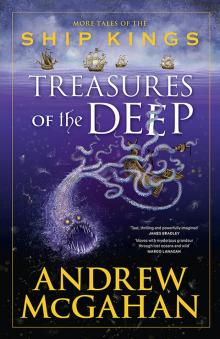 Treasures of the Deep
Treasures of the Deep The Rich Man’s House
The Rich Man’s House Praise
Praise The White Earth
The White Earth 1988
1988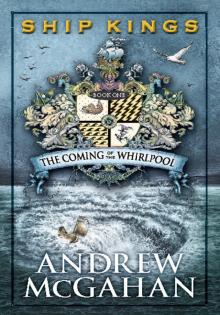 The Coming of the Whirlpool
The Coming of the Whirlpool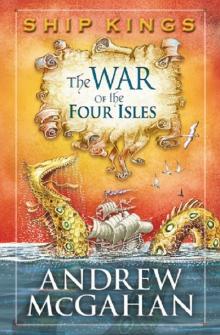 The War of the Four Isles
The War of the Four Isles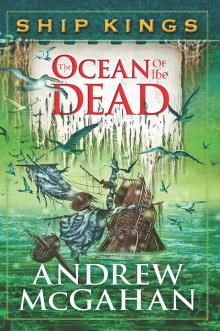 The Ocean of the Dead: Ship Kings 4
The Ocean of the Dead: Ship Kings 4 Last Drinks
Last Drinks Wonders of a Godless World
Wonders of a Godless World Underground
Underground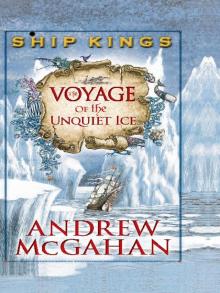 The Voyage of the Unquiet Ice
The Voyage of the Unquiet Ice